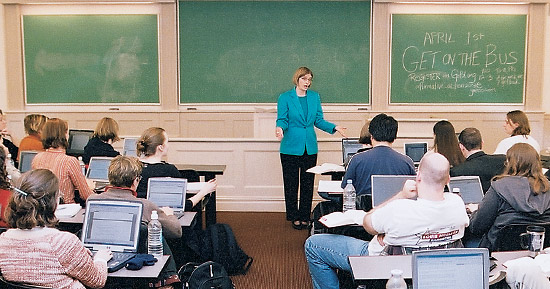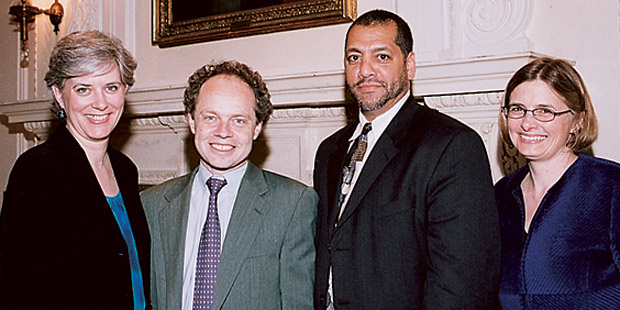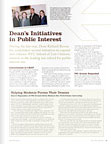Dean’s Initiatives in Public Interest
During the last year, Dean Richard Revesz has undertaken several initiatives to expand and enhance NYU School of Law’s historic mission as the leading law school for public interest law.
Printer Friendly VersionCommitment to LRAP
The longstanding Loan Repayment Assistance Program (LRAP), which was significantly expanded by an anonymous donor to assist the classes of 1998 through 2001, will now continue in its strengthened form as an established part of the Law School’s institutional commitment. Under this Program, students who work in public, community, and government service positions following graduation receive assistance from the Law School in paying their Law School loans, up to the full amount.
NYU School of Law has been an innovative force in its approach to public service. LRAP began providing benefits to graduates who completed their degrees in 1984. The class of 2003 will be the 20th class to benefit from this Program and the Law School’s longstanding commitment to public service. Currently, 257 participants in the Program serve underprivileged and underserved populations all over the world.
“A commitment of this magnitude is extremely expensive,” Revesz says. “But the needs of millions of people who have no access to justice in our nation are so great that I’ve decided to make this commitment without waiting for the external fundraising that we will need to fully finance the Program.”
Since summer 2002, approximately $6 million has been raised to ensure the commitment.
PIC Grants Expanded
Revesz also significantly increased the Law School’s support for students who choose to do public service work in their first and second summers by broadening its program of Public Interest Committee (PIC) grants.
[SIDEBAR: Helping Students Pursue Their Dreams]
For many years, NYU School of Law guaranteed PIC funding for second-year students and also devoted substantial resources to fund first-year students. However, because the number of public interest students at the Law School has been steadily growing, many first-year students who wanted to do public service internships this past summer received low numbers in the lottery and, despite the Law School’s generous funding of summer internships, it seemed that they might not receive funding. In February 2003, the dean announced that he would guarantee summer funding for all J.D. students, an announcement that was received by the students with relief and gratitude. In summer 2003, more than 300 students performed public service across the nation and around the world.
Moreover, to ease the financial pressure on students working in public service jobs over the summer, the Law School also increased the amount of the grants. First-year students now receive $4000 and second-year students receive $5000.
“With the significant expansions that we are now adopting, we further strengthen our institutional commitment as ‘a private university in the public service,’ ” Revesz says.
The expanded PIC program is supported in part by grants for environmental work by the Korein Foundation, the family foundation of alumna Elysabeth Kleinhans (’88); grants for students interested in international public interest placements established by Root-Tilden alumnus Eric Koenig (’84); and funds raised by the student-run annualPublic Service Auction.
More International and Government Placements
Revesz plans to expand the Public Interest Law Center’s (PILC) capabilities. As an example, Revesz and new PILC Director Deborah Ellis (’82) want to increase PILC’s international and government job placements, which will capitalize on the Law School’s leadership in both public interest law and international and global programs. The Public Interest Law Center, created in 1992 at the Law School, is a national model for the promotion of public service and one of the largest programs of its kind in the nation.
New Directors Named
This year, Dean Revesz appointed Deborah Ellis as assistant dean for public interest law, a newly created position. NYU President John Sexton also appointed Professor Vicki Been (’83) as the new faculty director of the Root-Tilden-Kern Program. For the first time in the Program’s history, both its director and faculty director are graduates of the Root Program. The appointments signal the Law School’s dedication to strengthening its commitment to public service and developing new public service initiatives.
Deborah Ellis (’82)
Ellis, as the assistant dean for public interest law, will direct both the Public Interest Law Center and the Root-Tilden-Kern Scholarship Program. Since 2001, Ellis has been an acting assistant professor in the Lawyering Program and also taught Sex Discrimination Law. “The appointment of Deb Ellis is a critical part of our initiatives to extend NYU’s historic mission as the leading law school for public interest law,” Revesz says. “Deb’s passion, experience, and dedication will undoubtedly help launch a whole new generation of lawyers into public interest law.”
[SIDEBAR: Five Students Awarded Skadden Fellowships]
Prior to joining the Lawyering faculty, Ellis had a distinguished public interest career, including four years as legal director of the NOW Legal Defense and Education Fund. She also served as legal director of the ACLU of New Jersey, and as a staff attorney at the ACLUWomen’s Rights Project and at the Southern Poverty Law Center. She has previously taught at Rutgers and Yale College.
“I believe NYU School of Law has the No. 1 public interest program in the country, with our committed students, dedicated faculty, generous financial support, and extensive alumni network,” Ellis says. “I’m excited to build on this superb foundation and take the Law School to the next level in public service.”
“As an NYU alumna myself, I have always been proud of NYU’s motto, ‘the private university in the public service.’ My goal is for all graduates to incorporate public service into their careers.”
To do this, Ellis believes that PILC should promote an expansive paradigm of public service. She notes that there are a multitude of opportunities for lawyers who want to do public service, including direct egal services; impact organizations; international human rights organizations; public defender offices; prosecutorial agencies; national, state, and local governments; foundations; community-based organizations; mediation services; “low bono” firms (representing clients who are middle income); and labor unions. Ellis acknowledges that there may be critics of this expansive view. For example, some of her public defender friends are not comfortable with calling prosecutors public interest lawyers. But to Ellis, the criminal justice system will work best if we have excellent lawyers on “both sides of the cases.”
“The network of Law School alumni doing public service is unparalleled,” observes Ellis. “In my own class alone (1982), many of my classmates are running significant public interest organizations throughout the country.”
In her new position, Ellis hopes to increase the connections between current students and alumni. For example, she is encouraging all alumni doing public service to join the PILC email alumni network, so that current students may contact them for career advice. Interested alumni can sign up for this network at www.law.nyu.edu/depts/ publicinterest/career/network/register.html.
Vicki Been (’83)
Been, a Root graduate and professor at NYU School of Law, was named faculty director of the Root-Tilden-Kern Program this year. In accepting this appointment, Been continues to demonstrate her commitment and dedication to the success of the Program and to its many students and alumni.
“The appointment of Vicki Been as faculty chair of the Root-Tilden-Kern Scholarship Program is a critical step forward in our plans to further strengthen our historic role as the nation’s first law school to establish a scholarship program for training lawyers for public and community service,” states NYU President John Sexton, who announced Been’s appointment. “Professor Been has been at the cutting edge of legal scholarship in environmental and land use law for more than a decade.”

Been graduated from NYU School of Law in 1983 and clerked for Judge Edward Weinfeld of the U.S. District Court for the Southern District of New York and for Justice Harry Blackmun of the U.S. Supreme Court.
Been, who joined the Law School’s faculty in 1990, teaches Property; Land Use Regulation; State and Local Government; and seminars on topics ranging from environmental justice to the Fifth Amendment’s Takings Clause. She co-teaches the Colloquium on the Law, Economics, and Politics of Urban Affairs.
Been writes extensively about land use regulation. Her recent work has explored the effect investor protections in the North American Free Trade Agreement and a growing number of other bilateral and multilateral investment agreements may have on environmental and land use regulations. Been also is a leading authority on environmental justice: She authored one of the first major articles on the distributional fairness of environmental and land use policies, “What’s Fairness Got to Do with It: Environmental Justice and the Siting of Locally Undesirable Land Uses.” She also documented the extent and nature of environmental discrimination in a nationwide longitudinal study of the demographic characteristics of communities asked to host undesirable land uses.
Been also writes about the Fifth Amendment prohibition against the taking of property without just compensation, often serving pro bono to advise nonprofit environmental and land use groups faced with takings challenges to environmental protections. She is the co-author of the leading land use casebook, Land Use Controls, with Robert Ellickson.


 Multimedia
Multimedia